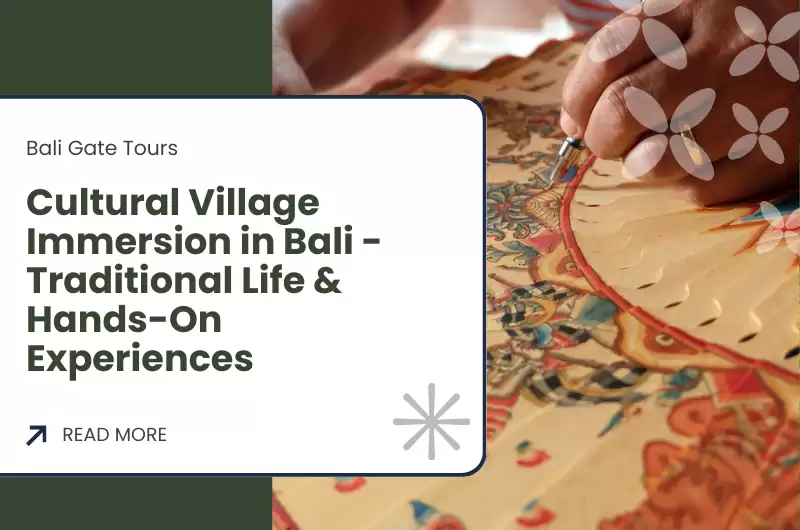Cultural Village Immersion in Bali - Traditional Life & Hands-On Experiences

Bali is renowned for its rich culture and vibrant traditions, but the true essence of the island is best discovered away from crowded tourist spots. Cultural village immersion offers travelers a unique opportunity to witness traditional Balinese life firsthand. From learning local crafts and farming techniques to participating in rituals and ceremonies, these experiences create a deep connection with the island’s heritage. Whether it’s strolling through rice terraces, engaging with artisans, or joining communal festivals, this type of tour transforms a typical vacation into a culturally enriching journey.
Exploring Traditional Balinese Villages
The heart of traditional Balinese life lies within its villages, where architecture, rituals, and daily routines reflect centuries of cultural evolution. Villages such as Penglipuran, Tenganan, and Trunyan showcase authentic Balinese community life, with intricately carved temples, bamboo houses, and communal spaces that host daily ceremonies. Visiting these villages allows travelers to observe the interplay between nature, spirituality, and community, a central aspect of Balinese culture.
Local guides often accompany visitors to explain historical contexts, symbolism in architecture, and the significance of everyday rituals. This insight elevates the experience beyond sightseeing, providing a nuanced understanding of the island’s social fabric.
Hands-On Craft Experiences
One of the highlights of a cultural village immersion is participating in hands-on activities. Bali is famous for its artisanal crafts, including woodcarving, batik, silver jewelry, and traditional painting. In village workshops, visitors can learn techniques directly from skilled artisans, creating their own keepsakes while understanding the cultural significance of each craft.
Engaging in these activities is more than a learning experience—it fosters respect for Balinese artistry and provides a tangible connection to local heritage. From selecting raw materials to applying intricate designs, every step demonstrates patience, precision, and dedication, qualities that define traditional craftsmanship.
Culinary Immersion: Learning Balinese Cuisine
Food is a central pillar of traditional Balinese life, and village tours often include culinary workshops. Guests can visit local markets to source fresh ingredients, learning about spices, herbs, and techniques essential to Balinese cuisine. Cooking classes allow travelers to prepare iconic dishes such as babi guling, lawar, or plant-based specialties, guided by experienced villagers.
This immersive culinary experience not only teaches practical cooking skills but also provides insights into local customs, festival foods, and the role of meals in daily life and religious ceremonies.
Participating in Local Rituals and Ceremonies
Bali’s spirituality is deeply intertwined with village life. Visitors to a cultural village often have the opportunity to observe or participate in daily rituals, temple ceremonies, and seasonal festivals. From offering flowers and rice at temple shrines to witnessing traditional dances and gamelan performances, these activities reveal the sacred rhythm of Balinese traditions.
Understanding the spiritual significance of these rituals enhances appreciation for the island’s philosophy of harmony among humans, nature, and the divine. Guides provide context, explaining symbolism and proper etiquette, ensuring that participation is respectful and meaningful.
Farm-to-Table Village Experiences
Agriculture is the backbone of many Balinese villages. Touring rice terraces, coconut groves, and spice gardens gives travelers insight into traditional farming techniques. Guests can try planting rice seedlings, harvesting vegetables, or learning about irrigation systems that have sustained communities for generations.
These activities emphasize sustainability and connection to the land. Participants gain hands-on knowledge of how Bali’s local communities balance daily life with ecological stewardship, often culminating in a freshly prepared village meal using ingredients harvested that day.
Connecting With the Community
A cultural village immersion isn’t complete without interaction with local residents. Many villages encourage conversations, storytelling, and collaborative activities that foster mutual understanding. Travelers learn about family structures, community governance, and the role of cooperative labor in sustaining Balinese culture.
Through these interactions, visitors often leave with more than souvenirs—they gain friendships, stories, and a profound appreciation for the resilience and warmth of Bali’s rural communities.
Planning Your Cultural Village Experience
To maximize the cultural immersion experience, consider these tips:
-
Choose Guided Tours: Local guides provide essential context and ensure respectful engagement with communities.
-
Dress Appropriately: Modest clothing is required for temple visits and ceremonial participation.
-
Be Open-Minded: Participating fully in crafts, cooking, and rituals enhances understanding.
-
Support Local Artisans: Purchasing handmade crafts directly supports village economies.
-
Sustainable Travel: Minimize environmental impact by following local guidelines and avoiding single-use plastics.
With careful planning, a cultural village immersion can be both educational and deeply rewarding.
Ideal for Families, Couples, and Solo Travelers
These tours are versatile, appealing to families wanting interactive experiences, couples seeking intimate cultural encounters, and solo travelers looking for meaningful engagement. Children enjoy craft workshops and farm activities, while adults can delve into culinary classes, temple rituals, or artisan techniques. The hands-on nature ensures every traveler has an enriching, participatory experience.
A Transformative Balinese Experience
Immersing yourself in a traditional Balinese village offers more than sightseeing—it’s an authentic journey into the heart of the island’s culture. Through craft workshops, cooking classes, ritual participation, and community interaction, travelers gain lasting memories and a profound understanding of Bali’s traditional life.
A cultural village immersion tour transforms your visit from a casual trip into a holistic experience that nurtures curiosity, creativity, and cultural appreciation. By engaging with local artisans, farmers, and spiritual practices, you walk away with not only souvenirs but also stories, skills, and meaningful connections that reflect the true soul of Bali.










